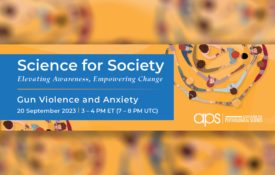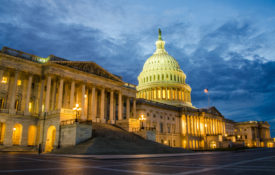-

Science for Society: Insights from Psychological Science on Gun Violence and Anxiety
In the first webinar of APS’s Science for Society series on September 20, 2023, scientists and advocates shared their expertise and perspectives on the relationship between gun-violence and anxiety.
-

Association for Psychological Science (APS) Statement on Looming U.S. Government Shutdown
APS calls on Congress to promptly fund the U.S. government for the coming fiscal year to sustain important scientific programs and initiatives.
-

New Content From Current Directions in Psychological Science
A sample of articles on facts about sign languages, the power of identity, reliable lie-detection methods, humans’ bias blind spot, the development of visual attention in infancy, and much more.
-

The Tale of Two Cities: Water Access Influences Human Decision Making
Podcast: Does our geographical location shape our thinking? Does water access have an effect on our decision-making habits? Under the Cortex hosts Dr. Hamid Harati and Thomas Talhelm, who explore how our ecological environment can shape our decision-making skills.
-
Online Talk Therapy Works as Well as an In-Person Session, a New Study Shows
Talking to your therapist over Zoom is as helpful for anxiety and depression as going to in-person therapy. The virtual session, moreover, can be delivered at any lower cost, according to a large new study conducted in the U.K. Online therapy has become more and more prevalent since the COVID pandemic, when lockdowns forced lots of therapists online. The new study suggests that one of the biggest benefits of virtual therapy may be that it can allow people to get treatment faster, which increases their quality of life and reduces the amount of additional medical care they require—and thus cuts costs overall.
-
The ‘Mandela Effect’ Describes the False Memories Many of Us Share. But Why Can’t Scientists Explain It?
Does Mr. Monopoly wear a monocle? Is there a black stripe on Pikachu’s tail? And does the fruit in the Fruit of the Loom logo pour out of a cornucopia? If you answered yes to any of these questions — sorry, you’re wrong. But you might also be experiencing the so-called Mandela Effect. Paranormal researcher Fiona Broome coined the name in 2009 after becoming convinced that then-South African President Nelson Mandela had died in prison in the 1980s. But Mandela did not die in prison; he was released in 1990, went on to lead South Africa and died in 2013. However, Broome noticed that many others seemed to share the same inaccurate memory, prompting further investigation.

